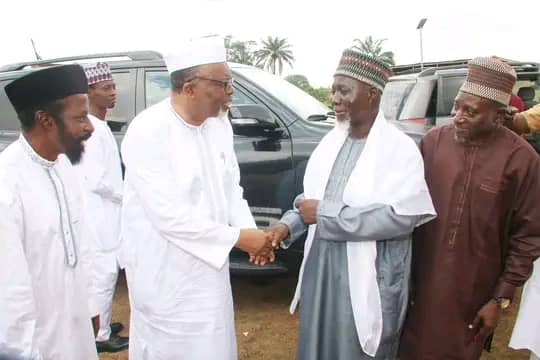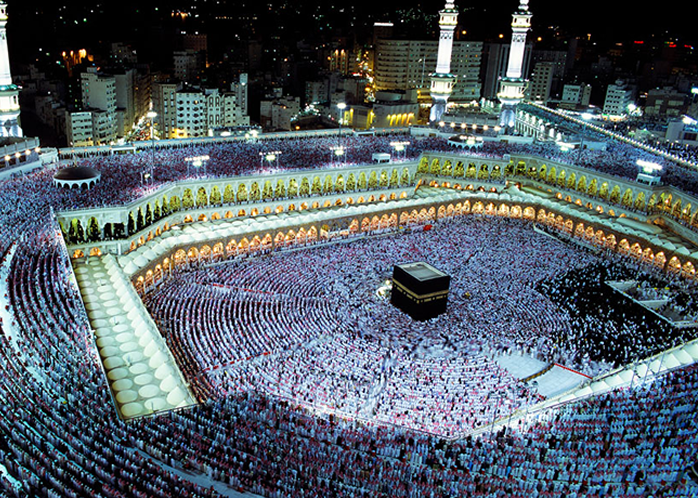It is the dawn of the Islamic sacred month of Hajj and, as usual, hundreds of thousands of Muslims are already converging on Islam’s holiest city of Mecca, Saudi Arabia for this year’s Hajj (pilgrimage) operations. Again, in the next few days, the pilgrims will join processions of over two million people and perform a series of Hajj rites: they will circumambulate (Tawaf) the Ka’ba seven times, run (Sa’y) back and forth between the hills of Safa and Marwah, drink from the Zamzam Well, go to Mina, and further, to the plains of Mount Arafat to stand in vigil, spend a night in the plain of Muzdalifa, and perform symbolic stoning of the devil by throwing stones at three pillars. After the sacrifice of their animal, they will shave their heads. Then they will celebrate the three-day global festival of Eid al-Adha. Returning to Mecca, they will perform the farewell circumambulation of the Ka’ba. It is equally going to be a festive period for the rest of the over 1.8 billion Muslims at home across the world, as they will slaughter millions of sacrificial animals and join in the merriness of the Eid-el-Kabir (the Great Festival), as it is popularly called. Now, all this observed, the Hajj, the Festival and all the rest will be over. And, as the remnant of the meats is consumed and pots and plates washed, the festive mood would be mellowed down with the usual supplication: may the Almighty Allah spare our lives to witness another of such festivities in the coming years! The Big Challenge More pertinently, however, any sober reflection on the current tumultuous time which the contemporary global Muslim world (ummah) is passing through should provoke the thought and concern of the entire global Muslim leaders and intelligentsia on the primacy of making more, pragmatic sociological sense of the Hajj. No doubt, in a holy month the sacredness of which is being profaned by the sacrileges of the ongoing Saudi-Yemen war, the protracted Syrian war, the atrocities of Boko Haram insurgents in Nigeria and the bombings and carnages across the rest Muslim countries etc., it is high time the global Muslim world begins to explore and exploit the sociological opportunities and benefits offered by Hajj to solve and resolve myriad of challenges confronting it; rather than the usual superficialities of the annual practice of the State sponsoring individuals for the Pilgrimage to Mecca, or the ostentatious fixing of ‘Hajj tooth’ by the merry-making tourist-pilgrims! Disturbingly, if, about 40 years ago, the Palestinian-American Professor of Islamic Studies, Ismail Raji Al-Faruqi (1982) had lamented that the crisis-stricken 20th Century Muslim “world ummah of Islam is undeniably the most unhappy ummah in the world in modern times,” for the reason that, “Despite the fact that it is the largest in number, the richest inland and resource, the greatest in legacy and the only one possessing the most viable ideology, the ummah is a very weak constituent of world order. It is fragmented into an endless variety of states, divided against itself, at loggerheads with other ummahs on all its frontiers,” we in the contemporary time cannot deny the fact that the narrative in the Muslim Ummah of the 21st Century has not fared better still. Rather, from the deepening feud and xenophobic tendencies between Saudi Arabia and Iran and their respective allies, to the diplomatic crises among the Gulf States and their political allies, and the instances of divisive and deadly inter-sectarian crises and clashes within various Muslim communities across the world, we see a Muslim world that has continued to be increasingly bedevilled by the escalating spate of division, disharmony, hostility, and the collapse of Islamic brotherhood, solidarity and diplomatic relations. True, with the instances of the scourge of state-sponsored political and religious persecutions, intra and inter-state wars and conflicts, intra-religious theological skirmishes and sectarian ideological conflicts and state-/group-sponsored terrorism trending across Muslim nations and communities, ours is a time where political disorder and upheavals, economic crisis, social unrest, poverty, diseases, and human rights abuses have become the commonwealth that is wreaking havoc upon the Muslim world, deepening the lack of peace, security, and development of a people who claim to believe in the religion of peace and Hajj! From reformist Salafism to Wahhabism, then to neo-Salafism, Takfiri-Jihadism, and radical Islamism, etc., we see ominous trends of Islamomania – Islamists’ fanatical, radical and extremist expression of Islam – destroying the fabrics of Muslims’ organic existence from the Middle East region, to the global world beyond. Sociological Utility of the Hajj From a utilitarian perspective, the Holy Quran aptly spells out the sociological utility of the Hajj to the Muslim world when it declares: “And proclaim unto mankind the Pilgrimage. They will come to thee on foot, and on every lean camel, coming by every distant track, that they may witness its benefits for them and may mention the Name of Allah, during the appointed days…..” (Quran, Surah al-Hajj, 22:28-29) As far back as the 1940s, the Second Supreme Head of the worldwide Ahmadiyya Muslim community, Hadhrat Mirza Bashirud-din Mahmud Ahmad (ra), in his characteristic insight and foresight, succinctly enlightened the Muslim world about the sociological importance of the Islamic Pilgrimage. He declared in his commentary on the foregoing Quranic verses thus: “Hajj provides pilgrims of different lands and diverse nationalities with an excellent opportunity to cultivate an acquaintance with one another and discuss matters of common interest”. “Apart from the spiritual good that the pilgrimage does to a Muslim, it possesses great social and political significance. It has great potentialities for welding different Muslim countries into one strong international brotherhood of Islam. Muslims from all parts of the world who meet at Mecca once a year can exchange views on all sorts of matters of international importance, renew old and establish new contacts. They have opportunities to acquaint themselves with the problems that confront their brethren in Faith in other countries, to copy one another’s good points and profit by one another experience and also co-operate with one another in many other ways. Mecca







